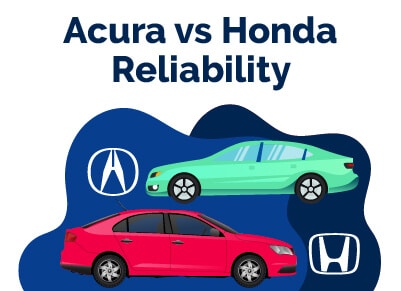Acura vs. Honda Reliability (Detailed Comparison)
March 23, 2023


Chris is Head of Content for FindTheBestCarPrice and is based out of Philadelphia, PA. As a seasoned automotive industry analyst and car enthusiast, he ensures the highest level of quality across all our content and curates our picks for the best deals each month.
Chris studied information systems and marketing at Drexel University and writes about a wide range of topics ranging from car buying tips to troubleshooting common mechanical issues.
When he’s not thinking about cars, he likes to stay in with his dog and make an “attempt” to finish a crossword puzzle (he’s not quite at the Saturday/Sunday level…yet). As a former cheesemonger, Chris still has a “sharp” passion for all things cheese, and his fridge is always loaded with it!
Chris also has a passion for things that go fast, and drones are no exception. He spends some of his time writing for Dronesourced.
When evaluating car reliability, understanding the nuances between brands is key, especially for potential buyers weighing Acura against BMW.
Acura, Honda's luxury arm, consistently scores high on reliability charts, offering vehicles that not only promise longevity but also maintain higher resale values and lower maintenance costs.
BMW, synonymous with performance and luxury, often entails a premium in upkeep and repair costs, potentially increasing the total cost of ownership.
A closer inspection reveals Acura's advantage stems from its parent company's reputation for durability and efficiency, translating into vehicles that are less likely to face costly repairs.
BMW, though offering advanced engineering and superior driving dynamics, may present higher maintenance challenges over time.
Our expertise suggests considering long-term ownership costs, warranty coverage, and resale value when choosing between these brands.
Let's delve deeper into the reliability of Acura and BMW to guide your choice with confidence.
Table of Contents
Acura vs. Honda Reliability: A Detailed Comparison
| Features | Acura | Honda |
| Design | ||
| Safety | ||
| Technology | ||
| Gas Mileage | ||
| Durability | ||
| Engine and Performance | ||
| Reliability and Maintenance Cost |
Acura vs. Honda Reliability: Which One Is Better?
Honda is better than Acura when it comes to reliability. This does not imply that Acuras are bad. You will get higher standards of reliability from Honda than you will from Acura.
According to RepairPal, Honda has a reliability rating of 4.0/5.0, ranking 1st out of 32 car brands. Acura is also doing well, ranking 2nd out of 32 car brands, with a reliability rating of 4.0/5.0.
Honda also outranks Acura on the JD Power 2022 dependability survey. This is strange because Acura always took the lead above Honda in 2020 and 2021.
Although Acura beats Honda with better warranty coverage, Honda offers better performance, and amazing interior designs, with better offerings in different categories.
Unlike Honda, which has a 3-year/36,000-mile limited warranty and a 5-year/60,000-mile powertrain, Acura's warranty coverage offers a 4-year/50,000-mile limited warranty and a 6-year/70,000-mile powertrain warranty.
Honda boasts higher safety ratings and better gas mileage. The Honda brand offers a better infotainment system and more intuitive and easy-to-use controls.
The irony of comparing Honda’s and Acura's reliability is that Acura is Honda's luxury and performance division. Honda is Acura's parent company, but both companies run their operations individually without interference from each other.
Although Honda has sustained a reputation for reliability, efficiency, and improved safety, Acura was the extension needed to launch the brand into the premium market. This also reflects in the pricing of Acura cars; the prices are always higher.
Acura vs. Honda Reliability: Design
Regarding design, both Acura and Honda offer a range of stylish and well-crafted vehicles. Acura vehicles are known for their sleek and sophisticated design, with many models featuring sleek lines, bold styling, and high-quality materials.
On the other hand, Honda vehicles are generally more modestly designed and tend to be more practical and functional.
Both brands offer a range of body styles, including sedans, SUVs, and sports cars, so you should be able to find a model that meets your needs and preferences regardless of which brand you choose.
The choice of Acura vs Honda designs boils down to your needs and preferences. Honda scores some points with its interior designs. Some Acura cars like the ILX look like they were made of cheap materials. This is without neglecting infotainment issues like the problematic touchpad controller.
Winner: Honda
Acura vs. Honda Reliability: Safety and Technology
Safety is an important factor when considering the reliability of any vehicle. Acura and Honda offer a range of advanced safety features to help protect you and your passengers. Both brands offer a range of airbags and stability control systems.
Some of the available advanced safety features come as standard equipment, while some models come as additional safety features. These are features like adaptive cruise control, lane-keeping assist, and automatic emergency braking.
In general, both brands have a strong reputation for producing safe vehicles, with many models having received top ratings from organizations such as the National Highway Traffic Safety Administration (NHTSA) and the Insurance Institute for Highway Safety (IIHS).
However, to decide which of the brands does it better than the other, we have to consider their safety ratings and take a look at the technology backing them up.
Both brands offer infotainment systems with large touchscreen displays, built-in navigation, smartphone integration, and a wide range of advanced driver assistance systems (ADAS) to help improve safety and convenience. The ADAS include automatic emergency braking, adaptive cruise control, and lane-keeping assist.
While it may seem like Acura vehicles offer more advanced technology features than Honda models, Honda holds higher safety ratings. More Hondas earn the IIHS Top Safety Pick(+) rating than Acura cars.
Winner: Honda
Acura vs. Honda Reliability: Repair and Maintenance Cost
Honda wins Acura by offering a cheaper repair and maintenance cost.
According to RepairPal, Honda has an average annual repair cost of $428, while Acura has a yearly cost of $501.
The beautiful thing about both brands is that the average cost of repairs on both brands is cheaper than the average cost of $652 for all car models and brands.
It is important to cite that Acura has an average 0.4 chance of scheduled and unscheduled repairs and 8% of severe damages. In contrast, Honda has a 10% chance of severe damages and a 0.3 chance of visits to a repair shop.
You can leverage the warranty coverage of both brands to cushion the effect of regular expenses from repairs and maintenance.
Winner: Honda
Acura vs. Honda Reliability: Engine and Performance
Both Acura and Honda offer a range of engines to choose from, ranging from efficient four-cylinder units to powerful V6 and V8 engines.
Generally, both brands are known for producing reliable, fuel-efficient engines and capable of delivering strong performance.
However, there are some differences to consider. For example, Acura engines are generally more powerful and refined, with many models featuring advanced technology such as direct injection and variable valve timing.
On the other hand, Honda engines tend to be more modestly powered and less expensive to repair, but they can still deliver robust performance and fuel efficiency.
The truth is, the comparison of Honda and Acura's engines is usually a mixed-ball game. This is because some Honda and Acura cars share the same engines.
For instance: The Honda Pilot and Acura MDX share the same engines and platforms, down to their transmission system. This is a similar case to the Acura 3.5L Earth Dream V6 that is also found in the Honda Odyssey, Ridgeline, and even the popular Accord.
There are some areas in which Acura outperforms Honda, and this includes the provision of sportier and more powerful engines. While Honda engines are less powered, they offer a higher level of reliability.
Winner: Both
Acura vs. Honda Reliability: Gas Mileage
There are many factors that influence a car's gas mileage aside from its design. Some of these features include the driving conditions, engine size, and overall size of the car.
For instance, you will get better fuel efficiency from small models than you will get from larger and performance-oriented models.
This indicates that the gas mileage for both brands will greatly vary according to your chosen model.
Here are some examples of the EPA-estimated fuel economy for some popular Acura and Honda models:
Acura
- Acura ILX (2.4L 4-cylinder engine): 25 mpg city/35 mpg highway
- Acura MDX (3.5L V6 engine): 20 mpg city/27 mpg highway
- Acura RDX (2.0L 4-cylinder engine): 22 mpg city/28 mpg highway
Honda
- Honda Civic (2.0L 4-cylinder engine): 28 mpg city/40 mpg highway
- Honda Accord (2.0L 4-cylinder engine): 30 mpg city/38 mpg highway
- Honda CR-V (2.4L 4-cylinder engine): 26 mpg city/32 mpg highway
Remember that the EPA provides these estimates and may not reflect real-world driving conditions.
The close comparison indicates that most Honda cars offer better gas mileage than Acura cars.
This is also because Acura doesn't sell hybrid cars, which is a major setback in terms of fuel efficiency.
Winner: Honda
Conclusion
Both Acura and Honda are reliable brands that offer a range of vehicles to choose from. Acura vehicles tend to be more powerful and sophisticated, with advanced engines and technology features, while Honda vehicles are generally more modestly powered and practical.
Both brands offer a range of advanced safety features and technology options, and both have a strong reputation for producing reliable vehicles.
Ultimately, the best choice for you will depend on your specific needs and preferences, as well as your budget. You should consider following recommended maintenance practices for any of the brand's cars that you wish to buy.
Best Car Deals by Category
Posted in Car Buying Tips, Car Troubleshooting |




